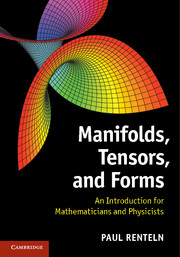Book contents
- Frontmatter
- Contents
- Preface
- 1 Linear algebra
- 2 Multilinear algebra
- 3 Differentiation on manifolds
- 4 Homotopy and de Rham cohomology
- 5 Elementary homology theory
- 6 Integration on manifolds
- 7 Vector bundles
- 8 Geometric manifolds
- 9 The degree of a smooth map
- Appendix A Mathematical background
- Appendix B The spectral theorem
- Appendix C Orientations and top-dimensional forms
- Appendix D Riemann normal coordinates
- Appendix E Holonomy of an infinitesimal loop
- Appendix F Frobenius' theorem
- Appendix G The topology of electrical circuits
- Appendix H Intrinsic and extrinsic curvature
- References
- Index
2 - Multilinear algebra
Published online by Cambridge University Press: 05 June 2014
- Frontmatter
- Contents
- Preface
- 1 Linear algebra
- 2 Multilinear algebra
- 3 Differentiation on manifolds
- 4 Homotopy and de Rham cohomology
- 5 Elementary homology theory
- 6 Integration on manifolds
- 7 Vector bundles
- 8 Geometric manifolds
- 9 The degree of a smooth map
- Appendix A Mathematical background
- Appendix B The spectral theorem
- Appendix C Orientations and top-dimensional forms
- Appendix D Riemann normal coordinates
- Appendix E Holonomy of an infinitesimal loop
- Appendix F Frobenius' theorem
- Appendix G The topology of electrical circuits
- Appendix H Intrinsic and extrinsic curvature
- References
- Index
Summary
Come, let us hasten to a higher plane
Where dyads tread the fairy fields of Venn,
Their indices bedecked from one to n
Commingled in an endless Markov chain!
Stanislaw LemMultilinear algebra is basically just linear algebra with many vector spaces at the same time. The fundamental objects are generalizations of vectors called tensors. Tensors can be viewed from many different perspectives. Mathematicians introduce tensors formally as a quotient of a certain module, while physicists introduce tensors using objects with many indices that transform in a specific way under a change of basis. Each definition is viewed disparagingly by the other camp, even though they are equivalent and both have their uses. We follow a middle approach here.
The tensor product
To start, we define a new kind of vector product, called the tensor product, usually denoted by the symbol ⊗. Given two vectors v and w, we can form their tensor product v ⊗ w. The product v ⊗ w is called a tensor of order 2 or a second-order tensor or a 2-tensor. The order of the factors matters, as w ⊗ v is generally different from v ⊗ w. In fancy language, the tensor product is noncommutative. We can form higher-order tensors by repeating this procedure. For example, given another vector u we can construct u ⊗ v ⊗ w, a third-order tensor. (The tensor product is associative, so we need not worry about parentheses.) Order-0 tensors are just scalars, while order-1 tensors are vectors.
Information
- Type
- Chapter
- Information
- Manifolds, Tensors, and FormsAn Introduction for Mathematicians and Physicists, pp. 30 - 53Publisher: Cambridge University PressPrint publication year: 2013
